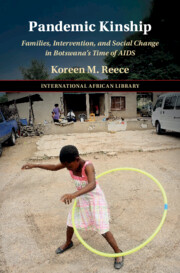Pandemic Kinship
Shaped around the stories of one extended family, their friends, neighbours, and community, Pandemic Kinship provides an intimate portrait of everyday life in Botswana’s time of AIDS. It challenges assumptions about a ‘crisis of care’ unfolding in the wake of the pandemic, showing that care – like other aspects of Tswana kinship – is routinely in crisis, and that the creative ways families navigate such crises make them kin. In Setswana, conflict and crisis are glossed as dikgang, and negotiating dikgang is an ethical practice that generates and reorients kin relations over time. Governmental and non-governmental organisations often misread the creativity of crisis, intervening in ways that may prove more harmful than the problems they set out to solve. Moving between family discussions, community events, and the daily work of orphan care projects and social work offices, Pandemic Kinship provides provocative insights into how we manage change in pandemic times. This title is available as Open Access on Cambridge Core.
Koreen M. Reece is Assistant Professor in Social Anthropology at the University of Bayreuth. She has over 18 years’ experience working in Botswana, first as an adviser to NGO and government responses to the AIDS epidemic, and later as an anthropologist.



